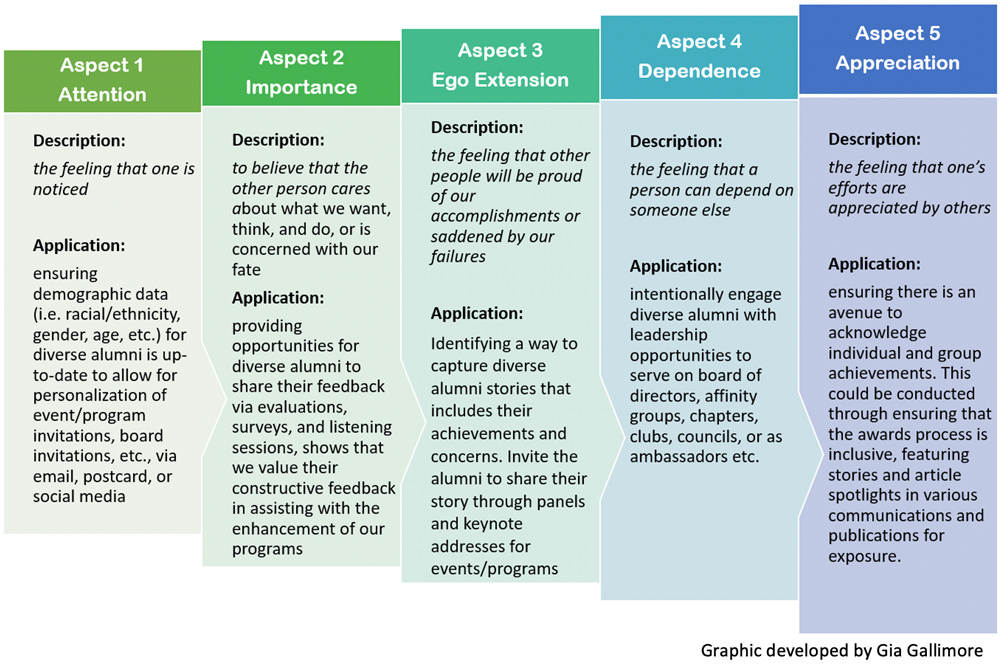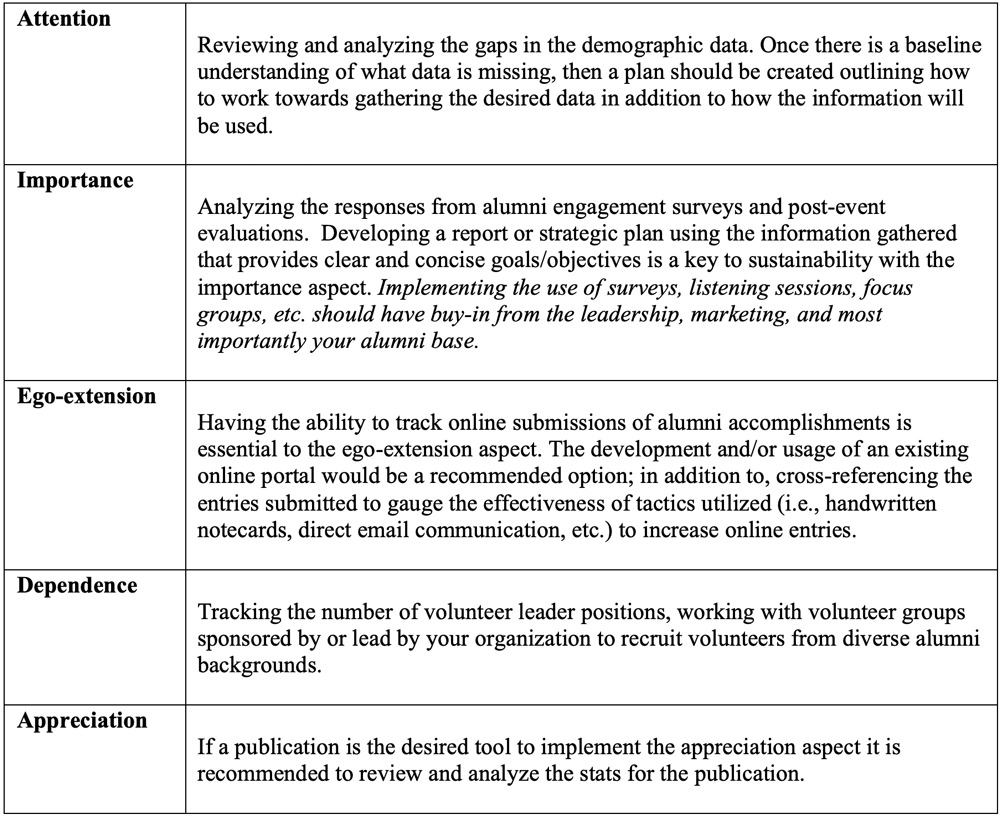
Gia Gallimore
M.Ed., Director of Diverse Alumni Engagement
Wisconsin Alumni Association (WAA)
University of Wisconsin, Madison
Upon entering the alumni relations profession, like so many, I entered with years of student affairs experience, which provided me an understanding of how to develop meaningful relationships with those who would one day become alumni. Having the opportunity to explore and implement student programming grounded in theoretical framework helped me realize the strong connection to alumni relations and engagement work. While it may seem unorthodox to some alumni relations professionals, student affairs theories are simply human development studies that provide a framework and common understanding for varying ways to support students as they matriculate through institutions. So, why not explore how to apply student affairs theoretical frameworks to enhance alumni relations and engagement among your constituents?
The Wisconsin Alumni Association (WAA) diversity initiatives are developed to engage alumni with the alumni association through program/event participation, volunteering, and philanthropic giving. The strategies implemented since joining the team in 2017 have focused on providing intentional and inclusive engagement opportunities using Nancy Schlossberg (1989) Marginality and Mattering Theory.
The Marginality and Mattering Theory examines the importance of providing ways for students to understand they are supported and valued by their institution. It was also designed to assist student affairs professionals in developing intentional programs and resources for students during their college experience. However, the five stages of the theory can also be applied to alumni engagement and can especially be useful in developing a program for diverse alumni engagement.
The primary focus of this article is to review and examine how alumni relations staff can apply and utilize the Marginality and Mattering Theory as a resource to develop a framework to increase engagement among their diverse alumni. Throughout this article, you’ll read examples of how WAA’s diverse alumni engagement team applied the five aspects of the theory between 2017-2019 to improve engagement among all alumni, and specifically diverse alumni.
Nancy Schlossberg Five Aspects of Mattering (1989) 
View Larger Image
Attention
Over the past few years, there has been an increased need for alumni associations at predominately white institutions to reexamine how they engage diverse alumni. It is important to remember, many alumni associations were founded in the 1800s during a time when philanthropic theories were developed by white men (Wagner & Ryan). To better understand how to engage diverse alumni, connecting the first aspect of attention, “the most elementary form of mattering is the feeling that one commands the interest or notice of another person” (Rosenberg & McCullough 164) to data collection and analysis can be beneficial to an alumni program.
Data can be considered a cornerstone of alumni engagement; therefore, incorporating the attention aspect to an alumni program can assist with driving the day-to-day business needs. For instance, when examining the demographic data at WAA, the team recognized there were gaps in the racial/ethnical data of alumni who graduated prior to 1977 because racial/ethnic data was not a recognized federally until then. Therefore, in Fall 2018, a demographic data campaign was administered a with a goal to improve data collection among alumni of color through a multi-channel approach that included email, postcard, and social media. Improved demographical profile of the constituents would aid in enhancing our understanding of who we are serving and more importantly, how, we serve our alumni.
Importance
The theory’s second aspect, importance, identifies the belief, “that other person[s] cares about what we want, think and do, or is concerned with our fate, is to matter” (Rosenberg & McCullough 164). Therefore, by providing opportunities for diverse alumni to share their feedback via evaluations, surveys, and listening sessions displays the alumni association values constructive feedback in assisting with enhancing programs.
The implementation of alumni listening sessions to the program have been beneficial in applying the importance aspect. To prepare for the sessions a set of core questions were developed and reviewed by the internal diversity workgroup, the marketing team, and leadership. We were intentional in hosting the sessions in spaces other that the alumni association (when sessions were hosted in Madison) with a goal of providing a space that is comfortable and neutral. The sessions were scheduled for 2.5 hours with a short break in between to allow for participants to connect. We provided light refreshments and beverages.
Two staff co-facilitated the session with one additional staff who served as note taker. Once the sessions were complete, all alumni received an electronic post-event survey 1-2 days after attending the session, which allowed alumni to provide information about their experience.
After completing the listening sessions, the team wrote and published strategic plans to aid in supporting an ongoing process of creating sustainable change in the level of engagement and participation among alumni. As a result, many alumni expressed their appreciation to the organization for listening and developing tangible action steps.
Ego-extension
Of all five aspects, ego-extension can be the most challenging to incorporate without having a way to capture alumni news and stories. Ego Extension is, “the feeling that other people will be proud of our accomplishments or saddened by our failures” (Rosenberg & McCullough 164) and can be accomplished by capturing diverse alumni stories which includes their achievements and concerns. Once you’ve created a library of alumni stories, there are future opportunities to host them as panelists and or keynote speaker for events and programs as well as various other areas of engagement.
In 2016, an online portal entitled Alumni Notes was developed by the communications team, which is a space for alumni to share their personal and professional news. This includes, but is not limited to career announcements, leadership roles (i.e., board member status), recognition (i.e., award recipient), volunteer work, etc. Once the team learned of the online portal, the program began to work towards increasing the number of submissions received from diverse alumni. The strategies used to share the alumni note portal with diverse alumni were:
- Sending personal email messages to alumni listening session participants
- Writing and mailing handwritten congratulatory cards to award recipients
- Sharing the information with event/program participants (when applicable)
We cannot attribute all diverse alumni note entries to these strategies but having a portal for alumni to provide self-submissions has been tremendously beneficial for connecting with all alumni, especially diverse alumni.
Dependence
Many alumni associations, if not all, provide opportunities for alumni to serve as volunteer leaders. In providing these opportunities, alumni make a commitment to support the alumni association whether through alumni boards, chapters/clubs, or affinity groups. These types of volunteer opportunities have a direct correlation to the fourth aspect dependence, “the feeling that a person can depend on someone else” (Rosenberg & McCullough 165). This aspect can be implemented by intentionally engaging diverse alumni with leadership opportunities to serve on board of directors, affinity groups, chapters, clubs, councils, or to serve in ambassador roles.
After the completion of the listening sessions, the team recognized that the reestablishment of identity-based affinity groups would be key to enacting the dependence aspect. In addition to the listening sessions, a survey was also emailed to core alumni audiences in the summer of 2019 to gather additional feedback regarding the reestablishment of identity-based affinity groups. The survey was well received with more than half of the respondents indicating a strong likelihood to participate in an identity-based alumni affinity group.
Since administering the survey, in the fall of 2019 the alumni association established a full-time position, Engagement Program Coordinator, to provide staff support to the affinity groups. Supporting the groups consists of coordinating monthly leadership training meetings, serving in an advisory capacity to assist with questions and to provide feedback, participating in events/programs (when feasible), and most importantly ensuring the affinity groups access to the number of resources (i.e., marketing, event supplies, funding, etc.) provided by the alumni association. This position also works closely with the domestic and international chapter teams to ensure volunteer resources are aligned across groups.
In the summer of 2020, the African American, Latinx, and Asian, Pacific Islander, Desi American affinity groups were launched, and most recently the Cooweeja Native and Indigenous affinity group was also reestablished. The team looks forward to the continued expansion of affinity groups to support and unite Badgers no matter where they live!
Appreciation
The final aspect of the theory is appreciation, “the feeling that other people will be proud of our accomplishments or saddened by our failures” (Schlossberg 1989) and can be accomplished by ensuring there is an avenue to acknowledge individual and group achievements. This could be applied by ensuring that award processes are inclusive or by featuring diverse stories and article spotlights in various organization communications and publications (e.g., magazines, newsletters) throughout the year.
In January 2019, WAA launched an electronic newsletter entitled, Badger Vibes with a goal to highlight and uplift the voices of alumni of color through stories. While many of the current publications are designed to encompass a broad audience, the development of Badger Vibes was intended to provide space to show appreciation of alumni of color and their accomplishments. However, having a dedicated electronic newsletter does not take the place of ensuring other publications are inclusive of race/ethnicity, gender, sexual orientation, etc.
Alumni Feedback
“Thank you, I look forward to signing up for the GLBTQ alumni affinity group. Let me know if you need any help in coordinating connections or hosting a home event (after the pandemic). Great work!”
– LGBTQ+ Listening Session Participant “I’m proud to see UW-Madison taking on and sharing the candid results of the research for this initiative. I currently serve as a deputy director of marketing for a nonprofit and we support 80,000 volunteers across the country. We’re making a concerted effort to reflect the diversity of our volunteer base, so I was pleased to see that as one piece of the strategy.”
-Response to Alumni of Color Strategic Plan “Leaders and members of the WI Alumni Association, thank you so much for the card recognizing the recent highlight of my leadership in the Madison365 Most Influential Black Leaders of 2020 list. WI is on the brink of much needed change for a more equitable and diverse future that’s been suppressed for some time. I pray your leaders continue to fight for that change no matter where they live. We need all the advocates we can get to contact legislation to support that change. On, Wisconsin!”
– Response to handwritten card “I’ve meant to write for quite some time. Badger Vibes is so well done. This is an important source of stories, and, not only for our alumni of color and other non-white alumni, but for the thousands of UW alumni who are committed to anti-racism and value and celebrate inclusion, diversity, and cultural and racial diversity.”
– Badger Vibes Recipient
Measurement and Sustainability of the Five Aspects
There are varying ways to measure the success as well as maintain the sustainability of the five aspects, attention, importance, ego-extension, dependence, and appreciation. The following suggestions of measurement and sustainability provided are merely a few ways to track progress.

View Larger Image
Overall, the recommendation for sustaining the application of the five aspects would be to develop a partnership with the marketing and communications, constituent data, and most importantly organizational leadership teams. If these teams understand the importance of building trust with the diverse alumni audience, ¬¬¬it can help with beginning the process toward creating a framework that aids in increasing engagement.
Conclusion
According to W.K. Kellogg Foundation (2012), “the face of philanthropy is rapidly changing to become as ethnically, culturally, and socioeconomically diverse as our country’s population, with some of the most significant growth stemming from identity-based philanthropy – a growing movement to spark philanthropic giving from a community on behalf of a community, where ‘community’ is defined by race, ethnicity, gender, and sexual orientation.”
When alumni relations staff take time to identify a model or framework much like the Schlossberg Marginality and Mattering theory to help guide their work it can aid in improving engagement among alumni, especially diverse alumni. More importantly, alumni who were once students of our great institutions and who were engaged with student development programming and supported by student development professionals are now awaiting similar engagement from alumni relations professionals.
Thus, alumni relations staff should consider utilizing the Schlosberg’s five aspects of mattering, or other student development-based theories, when developing a strategy for initiating, engaging, and maintaining engagement with alumni.
Works Cited
Gasman, M., and Bowman III, N. Engaging Diverse College Alumni: The Essential Guide to Fundraising. Taylor & Francis Group, 2013.
Schlossberg, N.K. “Marginality and Mattering: Key Issues in Building Community. “New Directions for Student Services.” 1989: 1-7.
Wagner, L. & Ryan, J.P. “Achieving diversity among fundraising professionals.” New Direction for Philanthropic Fundraising (n.d.): 66.
 Gia Gallimore is the Director of Diverse Alumni Engagement at the Wisconsin Alumni Association (WAA). In this role, she works to develop and establish strategic priorities to increase engagement among alumni through program/event participation, volunteering, and philanthropic giving. Gia received her Bachelor of Arts in African American World Studies from the University of Iowa in 2004 and her Master of Education from Iowa State University in 2008. In past positions, Gia has served as the Assistant Director of the UW Multicultural Student Center (MSC), Executive Team Leader of Asset Protection for Target Corporation, and Director of Impact for the Boys and Girls Club of Dane County. She is a wife, mother, and originally from Chicago, IL.
Gia Gallimore is the Director of Diverse Alumni Engagement at the Wisconsin Alumni Association (WAA). In this role, she works to develop and establish strategic priorities to increase engagement among alumni through program/event participation, volunteering, and philanthropic giving. Gia received her Bachelor of Arts in African American World Studies from the University of Iowa in 2004 and her Master of Education from Iowa State University in 2008. In past positions, Gia has served as the Assistant Director of the UW Multicultural Student Center (MSC), Executive Team Leader of Asset Protection for Target Corporation, and Director of Impact for the Boys and Girls Club of Dane County. She is a wife, mother, and originally from Chicago, IL.

